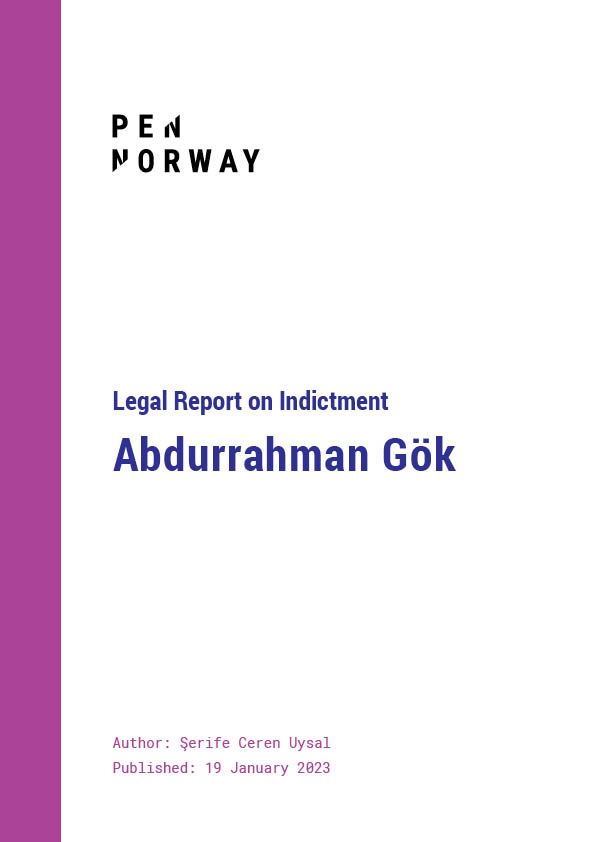PEN Norway Turkey Indictment Project – the case of Abdurrahman Gök
PEN Norway’s Turkey Indictment Project continues with three new indictment reports researched and authored by three leading international human rights lawyers in 2022.
A new analyses of indictments that directly concern freedom of expression in Turkey and particularly target journalists.
The report published today analyses the indictment against journalist Abdurrahman Gök
Read the full report here in English:
PEN Norway_Legal Report on Indictment A Gök Eng
Gök started to work at Dicle News Agency (DİHA) when he was still a university student in 2004. He performed various duties such as reporter, editor and regional news director, and also worked as a war correspondent in countries such as Iraq, Iran and Syria. Today, Gök is still working as an editor at the Mesopotamia News Agency.
On March 21, 2017, Kemal Kurkut, a 23-year-old participant in the Newroz celebrations in Diyarbakır, was shot and killed by security forces in front of everyone. As Gök was at the site to observe the Newroz celebrations, he documented the moment of Kurkut’s murder with 28 photos he took during the incident. The photographs Gök took were engraved in the popular memory and won Gök the special jury prize in the Metin Göktepe Journalism Awards.
Since 2017, these photos have caused a spate of criminal investigations to be launched against Abdurrahman Gök. However, the photographs fulfilled another function. Immediately after Kurkut was shot dead, the Governorate of Diyarbakır claimed that Kurkut was a suspected suicide bomber. However, the photographs taken by Gök refuted those claims as the the photographs showed Kurkut running away, with his upper body naked. In other words, his photographs have essentially become the evidence of an extrajudicial execution.
This indictment was written in September 2020 when Gök was accused to be a member of a terrorist organization and of making terrorist propaganda. The evidence listed and discussed in the indictment mainly consists of his reportings, his work-related phone conversations and his social media posts.
The 5th High Criminal Court of Diyarbakır ruled that journalist Gök was not proven guilty of membership in an armed terrorist organization and therefore acquitted him of the charge, but also ruled that he be sentenced to 1 year, 6 months, and 22 days of imprisonment on charges of making successive propaganda for a terrorist organization. That the Court stated, in its reasoned judgement, that Gök’s defence was “disregarded because its aim was to evade the accusations” will be a phrase to be remembered for years in Turkish legal history.
While we were preparing this report to publishing his case was upheld by the Court of Appeal on 12 January 2023 and his lawyers announced that they will appeal to the Court of Cassation. And yesterday, on 18 January 2023, another court announced its verdict regarding the police officer who was tried because of Kemal Kurkut’s murder and ruled not to impose any penalty upon him.
Lawyer Şerife Ceren Uysal evaluated the indictment against Gök in the light of Turkey’s domestic law and international law. Uysal points out that the prosecutor failed to explain why an investigation was launched against Gök in the indictment. According to Uysal, this strengthens the plausibility of the allegations frequently voiced by both Gök and his lawyers and press organizations in Turkey that “this investigation was a revenge against Gök who took photographs of Kurkut and published them to expose an act that the government wanted to cover up”. In this sense, the contents of the indictment raise less questions about why the indictment was drafted than why an investigation was launched against Gök in the first place. Therefore, she concludes that with prosecutor’s attitude that disregarded freedom of the press and freedom of expression, the prosecutor not only failed to fulfil these two basic requirements, but also reinforced the impression that he was acting on behalf of the political authority with a direct motivation to see the defendant punished. And she points out that a shift must occur in the authoritarian and anti-democratic political climate that encourages or emboldens prosecutors to draft such indictments or reassures them when they transform such accusations into indictments.
Due to the ongoing crisis in the judiciary and deteriorated state of the rule of law in Türkiye we will continue to analyse indictments that directly concern freedom of expression in 2023





